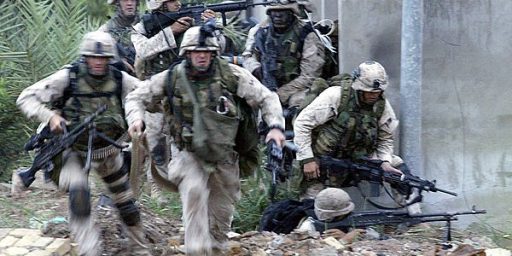Shi’ite Fighters Disarming in Baghdad
Shi’ite Fighters Hand Over Arms for Cash in Baghdad (Wired – Reuters)
A Shi’ite militia disarmament plan that could end weeks of fighting in Baghdad got slowly under way on Monday as Iraq’s interim government pursued peace talks with the rebel-held Sunni Muslim city of Falluja.
“I’ve given up my weapons, I’m with the interim government now,” said Ahmed Hashem after handing over 22 rocket-propelled grenades. “We want peace and I won’t fight the Americans.” Hashem received $1,100 for his stash, under a plan that pays $50 for any AK-47, rocket-propelled grenade or mortar round.The U.S.-backed government aims to retake control of rebel-held areas throughout Iraq by political or military means ahead of national assembly elections due in January. Mehdi Army fighters led by Moqtada al-Sadr began handing in weapons at the start of a five-day period in which they have agreed to disarm in the flashpoint Sadr City district.
*** After the five days allowed for disarmament, police and National Guards are due to take control of Sadr City, where the government has pledged to spend over $500 million on rebuilding. “If necessary we will extend the five-day period,” a senior security official, Abdul-Karim al-Saffar, told Reuters. He estimated that Sadr fighters would receive up to half a million dollars on Monday under the money-for-guns arrangement, although a Sadr spokesman said true militiamen were handing over their weapons for free.
“Some arms traders want to benefit from this deal to make money,” Abdul Hadi al-Daraji told Reuters. “We have to make a difference between the resistance, which is delivering its weapons for free, and those who are using the deal.”Peace talks are also under way to try to resolve a standoff in the Sunni Muslim stronghold of Falluja, west of Baghdad, held by insurgents since a failed U.S. assault in April. Falluja representatives met Defense Minister Hazim Shaalan in Baghdad to hear details of his plans to deploy National Guards in the city under a proposed agreement. Some insurgents in Falluja have said they do not object to such a deal, or to participation in the elections, as long as U.S. forces keep out of the Sunni stronghold west of Baghdad. A deal to end bloody battles between U.S. marines and guerrillas in April by handing control to a Falluja Brigade that included ex-Baathist army officers collapsed a few months later.
The U.S. military now regards Falluja as a haven for foreign fighters led by Jordanian Abu Musab al-Zarqawi, seen as America’s deadliest enemy in Iraq. It has conducted frequent air strikes on suspected Zarqawi targets in the city of 300,000. It is not clear whether any deals struck in Sadr City, Falluja or elsewhere can staunch the bloody chaos into which Iraq has sunk since last year’s U.S.-led invasion.
Interesting developments. I’m skeptical of money for weapons programs, as they tend to result in the turn-in of obsolete guns. It’s conceivable that it could work in this instance, though, if it gives people an incentive and a face-saving means of doing what they already want to do. As Allawi’s government establishes legitimacy and people on the margins of the insurgency come to believe elections will actually happen, it’s quite possible that their desire to fight has diminished.



